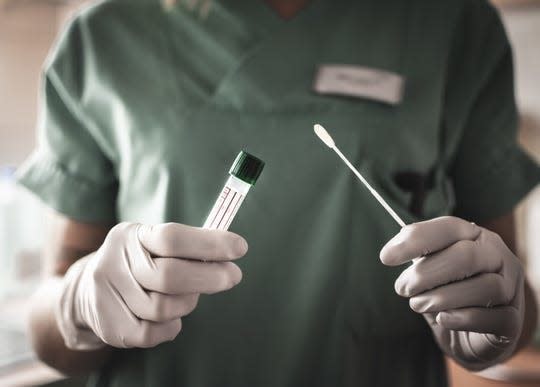Should you be concerned about the rising COVID-19 rate in Monroe County?
- Oops!Something went wrong.Please try again later.

Despite a recent increase in COVID-19 cases across Indiana and the country, Monroe County is classified by the Centers for Disease Control and Prevention as low for COVID-19. Counties are classified by the number of cases in the area and the effect on local hospitals.
The rate of reinfection of COVID-19 cases in Monroe County has increased to 7.7% from May 12 to 19, according to the Indiana State Department of Health. Only reinfections after Sept. 1, 2021, are included in the data.
More on COVID-19: Monroe County's COVID cases fall 24%; Indiana cases surge 20.7%
Monroe County Health Department Administrator Penny Caudill said as long as hospitalizations stay low, so will the community level. While the virus has been circulating at a higher rate, most people are experiencing mild illness, she said.
The health department's three main goals are to prevent deaths, prevent hospitalizations and keep the transmission rate as low as possible, Caudill said.
“COVID-19 is not going to go away,” she said. “We will continue to deal with it.”
One of the most important ways to prevent further spread is to keep people informed, Caudill said. Residents should assess their need for masks, when to get tested and when to quarantine or isolate, she said, to help reduce the spread.
“We are in this together and by each of us doing our part to keep ourselves and those around us safe, we can keep our community safer,” she said.
The Monroe County Health Department, along with other health departments, has received at-home testing kits to distribute to the community. Vaccines are available at the Monroe County Public Health Clinic as well as area pharmacies.
What about variants and a mask mandate?
Caudill said if Monroe County were to reach a high community level, mask mandates may be considered. But it can be avoided if residents take precautions.
“I think it’s fair to say that most everybody would like to never have to go back to a mandate,” she said. “But that doesn’t mean that the situation won’t call for that.”
Residents can best protect themselves by getting all the recommended COVID-19 vaccinations, she said.
“No vaccine is perfect,” she said. “But they really are effective.”
Residents can receive updates on community levels through the Monroe County Citizen Alerts system.
New variants such as BA.4 and BA.5 have begun to spread in Europe, but not much in the U.S., Caudill said. While the variants are more transmissible, they are less severe.
“The best way to avoid variants is for all of us to get vaccinated,” she said.
Hospital managing cases for now
Tom Hrisomalos, infectious disease physician with IU Health Bloomington, said the recent increase in cases has not significantly affected IU hospitals.
It’s difficult to know how big this wave might be, he said, because of a lack of data. At-home tests, for example, are not included in the case count since they aren’t reported.
Many COVID-19 cases in the hospital are diagnosed accidentally, Hrisomalos said. Patients coming in for another reason may test positive for COVID-19.
Higher levels of immunity in the population from people who have had COVID-19 or been vaccinated also helps lessen the severity of the spread.
"Some of the milder illness that we’re seeing is because there’s increased immunity in the population, and that’s a good thing,” he said.
Hrisomalos said he’s concerned new variants will continue to evolve.
“I’m afraid we will continue to see some level of new viruses popping up for probably quite a while,” he said.
Concerns about COVID reinfection
Graham McKeen, IU assistant university director of public and environmental health, said he expects hospitalizations and deaths to increase due to the increasing number of infections.
“This virus has evolved tremendously, and it’s way more infectious than it used to be,” he said. “We’re climbing that ladder of infectiousness very quickly.”
The ability to be reinfected with COVID-19 is a big concern, McKeen said. The best way to disrupt those transmissions is to wear effective filtration masks indoors, especially in crowded settings, he said.
The reduced number of IU students in Monroe County over the summer will help to decrease overall cases, McKeen said. But the level of infection is still increasing for those who remain.
Monroe County and Tippecanoe County, which houses Purdue University, have had the highest case rates recently. McKeen said this is likely due to the universities and travel involved.
McKeen said IU will offer drop-off PCR tests through the end of May and will transition to antigen tests after. Other testing sites and at-home tests can be found or ordered on the ISDH website. At-home tests also are available at a number of retail pharmacies. The Covid Clinic is also available in the College Mall parking lot.
More: COVID testing outside College Mall is unlike other options. Here's what's different.
IU continues to do contact tracing, daily case investigations, outbreak investigations and more to prevent the spread, McKeen said.
“People need to be aware that this is a way more contagious virus than we’ve dealt with just even some months ago, and it's not over,” he said. “There’s still a lot of benefit in minimizing and reducing the spread.”
Reach Luzane Draughon at ldraughon@gannett.com.
This article originally appeared on The Herald-Times: Monroe County COVID reinfection rates climbing
